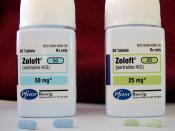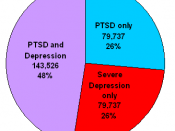Major depression disorder is defined in our textbook as a long lasting depressed mood that interferes with the ability to function, feel pleasure, or maintain interest in life. What exactly triggers depression is not fully known, but it is believed that depression is caused by a combination of several factors such as biological and psychosocial factors. One can't say that one factor is more important to the causes of depression than the other because both have its own significant role in depression.
Biological factors such as the fluctuation of chemicals in the brain and genetics play a major role in depression. Research has found that the imbalances of neurotransmitters, serotonin and norepinephrine, can cause a person to be depressed. A low level of serotonin may cause the person to have sleep problems, and to be anxious and irritable. Also a deficiency of norepinephrine, which regulates arousal and alertness, can make a person fatigue and loses the interest in everyday activities.
Drugs that can alter the activities of these neurotransmitters can be taken to help decrease the symptoms of depression. Research has also found depression to be inheritable. Studies of identical twins showed that if one twin suffers from depression, the other twin has a 50 percent chance of getting it too.
Psychosocial causes vary in people with depression. Situations such as: stress from work, loss of a love one, relationship problems, traumatic events, or any other crises encounter may affect our thoughts, emotions, and behaviors. How people react to these situations may lead to the development of depression.
Both biological and psychosocial factors are important to the causes of depression. It is hard to scientifically test which factor is the primary cause. Both have its own contributions and they work together to cause depression.


